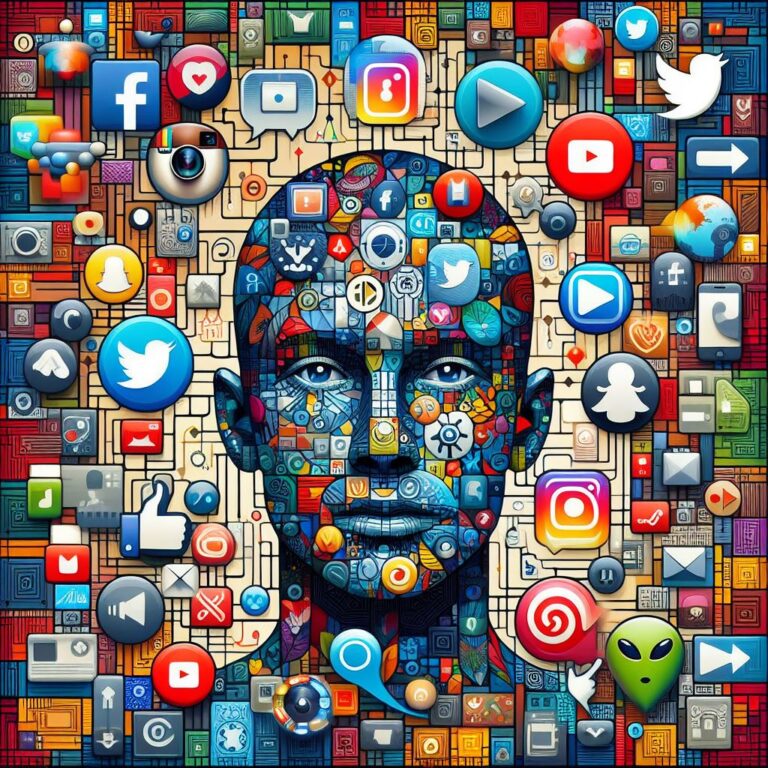In today’s digital age, social media platforms have become integral parts of our daily lives, shaping how we communicate, connect, and express ourselves. While these platforms offer unprecedented opportunities for social interaction and networking, they also have significant implications for mental health. In this article, we explore the multifaceted impact of social media on mental well-being, examining both the positive and negative effects and providing strategies for navigating this complex landscape.
The Rise of Social Media: A Double-Edged Sword
Social media has revolutionized the way we interact with one another, allowing us to stay connected with friends and family, discover new communities, and share our thoughts and experiences with the world. Platforms like Facebook, Instagram, and Twitter have democratized communication, giving individuals a voice on a global scale. However, this constant connectivity also comes with drawbacks, as it can lead to feelings of social comparison, anxiety, and FOMO (fear of missing out). Metaphorically, social media is like a double-edged sword, offering both opportunities for connection and challenges to mental well-being.
The Impact of Social Comparison: The Perils of Perfection
One of the most significant effects of social media on mental health is the phenomenon of social comparison. When we scroll through our feeds, we are bombarded with carefully curated images and narratives of others’ lives, often depicting idealized versions of reality. This can lead to feelings of inadequacy, jealousy, and low self-esteem as we compare ourselves to these unrealistic standards. Research has shown that excessive social media use is associated with higher levels of depression and anxiety, particularly among young people who are more susceptible to these influences. Metaphorically, social media is like a magnifying glass, amplifying our insecurities and highlighting the gap between perception and reality.
The Influence of Likes and Validation: Chasing the Digital High
Another aspect of social media that can impact mental health is the pursuit of likes, comments, and validation from others. Every notification triggers a release of dopamine, the brain’s reward neurotransmitter, creating a cycle of seeking external approval for our online presence. This quest for validation can lead to addictive behaviors, where individuals feel compelled to constantly check their phones and post content in pursuit of likes and validation. Over time, this can erode self-esteem and self-worth, as our sense of value becomes tied to external metrics of popularity. Metaphorically, social media is like a digital casino, enticing users with the promise of rewards and leaving them hooked on the pursuit of validation.
The Impact of Cyberbullying: The Dark Side of Connectivity
While social media has the potential to foster positive connections, it also harbors darker elements, such as cyberbullying and online harassment. Behind the veil of anonymity, individuals may engage in hurtful behavior, spreading rumors, making derogatory comments, or sharing private information without consent. This can have devastating effects on the mental health of victims, leading to feelings of shame, isolation, and despair. Moreover, the viral nature of social media means that harmful content can quickly spread, amplifying its impact and making it difficult to escape. Metaphorically, social media is like a digital playground, where bullies lurk in the shadows, ready to pounce on unsuspecting victims.
Cultivating Digital Well-Being: Strategies for Healthy Social Media Use
Despite the potential risks, it is possible to cultivate a healthy relationship with social media and protect our mental well-being. One strategy is to set boundaries around our social media usage, limiting the amount of time we spend online and taking regular breaks to disconnect and recharge. Additionally, curating our feeds to include content that uplifts and inspires us can help counteract the negative effects of social comparison. Practicing mindfulness and being intentional about our online interactions can also help us stay grounded and present in the moment. Metaphorically, managing social media is like tending to a garden, where careful cultivation and attention yield a flourishing and vibrant landscape.
Conclusion: Navigating the Digital Landscape
In conclusion, the impact of social media on mental health is complex and multifaceted. While these platforms offer unprecedented opportunities for connection and self-expression, they also pose significant challenges to our well-being. By understanding the potential risks and adopting strategies for healthy social media use, we can navigate this digital landscape with greater resilience and mindfulness. Ultimately, it is up to each individual to strike a balance that promotes mental well-being while harnessing the positive aspects of social media for personal growth and connection.
Check out more articles related to this topic at Lifestyle & Wellness Archives – Topic In One Article
